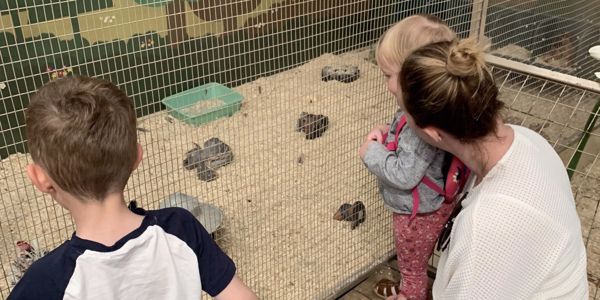Grandparents can often be even more excited about the birth of your child than you are, especially if it’s their first time becoming a grandma or grandpa. Their cries with happiness when you break the good news are quickly followed by anecdotes from their experience raising you, the digging out of old baby clothes from the 80s and 90s and the constant fussing over both you and your bump - you gotta love ‘em!
The birth of a baby can be a very overwhelming and emotional time for a new mother; carrying a baby in her womb for 9 long months can certainly be exhausting. The lack of sleep, aches and pains as well as the constant attention, feeding and settling the baby will need once it arrives can leave new parents needing room to breathe. The last thing a new mother might want is to be fussed over or not given the space she needs. A little bonding time with their new family unit for a few weeks after birth does not go amiss - mostly to figure out do’s and don’ts of the parenting role they’ve taken on and find out what works for them.
Involving the grandparents to help with caring for their new grandchild could give the parents a chance to sleep, or even maintain a social life now they’ve entered their new family bubble. However, there is often a fine line between ‘helping’ and ‘interfering’, which has seen countless mother-daughter conflicts during the newborn period.
Varying from mother to mother, the idea of help can go one of two ways. Some new mothers, particularly when it’s their first child, will either want to find their own style of parenting, figure things out for themselves and learn from their own mistakes. Whilst others may search for help, advice and guidance wherever they can, often looking to their own mothers for help and support. Some women even want a combination of the two.
Some mothers can also suffer from postnatal depression [link to blog] or anxiety, which is more likely when they are sleep deprived or has existing self-esteem issues. This can leave the mother feeling ‘inadequate’ and can have a hard time getting the hang of things in the first few weeks after birth. Giving a little helping hand and words of encouragement from family could mean a great deal. Removing the burdens of running the household, such as shopping, cleaning and cooking whilst they’re caring for their newborn could be a great way to ease the mother’s stresses, even taking the baby out for a little stroll could give mum the hour-long nap or shower she’s been so craving.
It’s really important to ask a new mother what she would like help with, rather than assuming or doing what she may consider ‘interfering’. The most important thing is that the mother is given the help she needs, not given the help you want to give. Feeling unsupported and isolated is one of the biggest causes of depression and anxiety in new mothers, so don’t wait until a mother asks for help, ask her what help she may need and insist, even if it’s to take out the bins or change a nappy.
Your Baby Club and Center Parcs are giving you a chance to win a family break in a Woodland Lodge at a UK Center Parcs village of your choice.
It’s equally as important for new parents to make room for grandparents and involve them with their newborn. To ask for help when it’s needed, or even just take them up on their offer to hold the baby for 10 minutes while you catch a break. Grandparents can often feel unwelcome or kept at a distance if they feel they are being excluded from their new grandchild’s life. Making time to allow them to visit or getting grandma round to help with the cleaning, or granddad round to help dad build things could go a long way in building your relationship with the grandparents, as well as some essential bonding time for them and baby.
All grandparents should know these key things when helping their own children with parenting:
- You had to learn everything once too. Hold back on offering advice or criticising and only offer advice when mum wants it.
- Assure the parents they are doing well, no matter what.
- Be there as a helping hand. The more positive your child sees your presence when the baby is born, the more you will be involved later on.
- Let the parents choose what support they need and when.
All parents should know these key things when involving the grandparents:
- All they want to do is help, don’t push them away or make them feel they’re unwanted or not needed.
- If they lend advice and you disagree, agree to disagree. After all, you’re learning, and they learnt once too.
- Guidelines and recommendations around caring for a baby have changed substantially over the years, don’t always do as your parents tell you, it may no longer be safe/appropriate.
- Allow the grandparents to help with the little things, and take advantage of their presence - it may be the only time you can get some sleep or a shower!
It has to be noted that everyone has different parenting styles and way of doing things. When giving advice, it is important for grandparents not to be too pushy with their anecdotes or advice on how things should be done. Healthy and Safety guidelines around babies’ sleeping, bathing, eating, weaning constantly changes, and may not be as strict or as carefree as they used to be, so it’s imperative all new mums, and new grandparents keep up to date on these guidelines to help mum and ensure baby remains happy and healthy.






